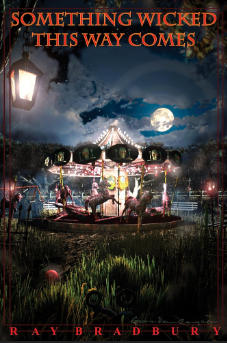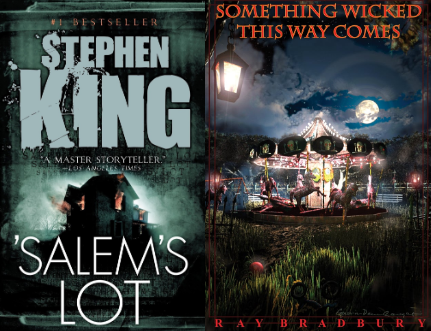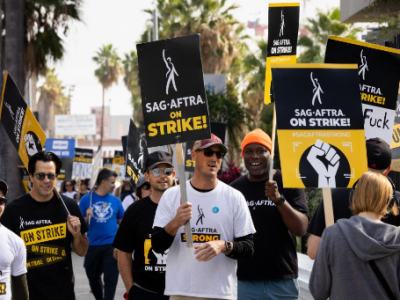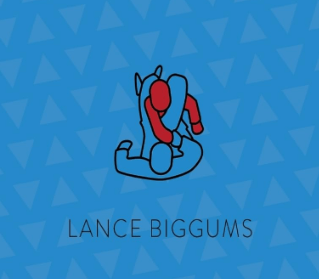After taking a break from writing about politics, I decided to read a few novels. This was partly due to boredom, but I also wanted to see if something could rub off on me and improve my own fiction. I figured I should start with the classics. I’ve never read much horror, so I figured it was time to catch up on that.
The first novel I read was Stephen King’s second novel “Salem’s Lot,” published in 1975, and recommended to me by quite a few people, online and off. The only work of King that I had previously read was “The Gunslinger.” I read that when I was thirteen, and don’t remember liking it. In contrast, I think that Salem’s Lot would be an outright masterpiece were it 20% shorter, as an absurd amount of description bogs down the otherwise excellent story.
I’ve even seen some people praise King for his detailed – and constant – descriptions of the small town life in Jerusalem’s Lot, where the novel takes place. I’m shocked to hear this, as I almost dropped the book at two different points. First, the astonishingly bad prologue, which I’ll circle back to later. Second, the first few chapters of the book, where basically nothing happens except for King tediously describing just about everything that happens in this small town.
It took me until page 140, of 656, to get hooked. I won’t say that nothing happened before then, but it was incredibly slow paced. Then he pens this amazing scene.
They spared a last look for the crated sideboard leaning against the side of the U-Haul and then Hank pulled the back door down with a bang. He got in behind the wheel and they drove up Jointner Avenue onto the Brooks Road. A minute later the Marsten House loomed ahead of them, dark and crepitating, and Royal felt the first thread of real fear worm its way into his belly.
“Lordy, that’s a creepy place,” Hank murmured. “Who’d want to live there?”
“I don’t know. You see any lights on behind those shutters?”
“No.” The house seemed to lean toward them, as if awaiting their arrival.
The backstory is that these two unfortunate men were hired to transport what we know to be the vampire’s coffin, but which they just think is a mysteriously creepy box, to the formerly abandoned Marsten House. They’ve been instructed to take it all the way down into the cellar, under the cover of night.
Hank wheeled the truck up the driveway and around to the back. Neither of them looked too closely at what the bouncing headlights might reveal in the rank grass of the back yard. Hank felt a strain of fear enter his heart that he had not even felt in Nam, although he had been scared most of his time there. That was a rational fear. Fear that you might step on a pongee stick and see your foot swell up like some noxious green balloon, fear that some kid in black p.j.’s whose name you couldn’t even fit in your mouth might blow your head off with a Russian rifle, fear that you might draw a Crazy Jake on patrol that might want you to blow up everyone in a village where the Cong had been a week before. But this fear was childlike, dreamy. There was no reference point to it. A house was a house—boards and hinges and nails and sills. There was no reason, really no reason, to feel that each splintered crack was exhaling its own chalky aroma of evil. That was just plain stupid thinking. Ghosts? He didn’t believe in ghosts. Not after Nam.
He had to fumble twice for reverse, and then backed the truck jerkily up to the bulkhead leading to the cellar. The rusted doors stood open, and in the red glow of the truck’s taillights, the shallow stone steps seemed to lead down into hell.
“Man, I don’t dig this at all,” Hank said. He tried to smile and it became a grimace.
“Me either.”
They looked at each other in the wan dash lights, the fear heavy on both of them. But childhood was beyond them, and they were incapable of going back with the job undone because of irrational fear—how would they explain it in bright daylight? The job had to be done.
Hank killed the engine and they got out and walked around to the back of the truck. Royal climbed up, released the door catch, and thrust the door up on its tracks.
The box sat there, sawdust still clinging to it, squat and mute.
“God, I don’t want to take that down there!” Hank Peters choked out, and his voice was almost a sob.
“Come on up,” Royal said. “Let’s get rid of it.”
They dragged the box onto the lift and let it down with a hiss of escaping air. When it was at waist level, Hank let go of the lever and they gripped it.
“Easy,” Royal grunted, backing toward the steps. “Easy does it…easy…” In the red glow of the taillights his face was constricted and corded like the face of a man having a heart attack.
He backed down the stairs one at a time, and as the box tilted up against his chest, he felt its dreadful weight settle against him like a slab of stone. It was heavy, he would think later, but not that heavy. He and Hank had muscled bigger loads for Larry Crockett, both upstairs and down, but there was something about the atmosphere of this place that took the heart out of you and made you no good.
The steps were slimy-slick and twice he tottered on the precarious edge of balance, crying out miserably, “Hey! For Christ’s sake! Watch it!”
And then they were down. The ceiling was low above them and they carried the sideboard bent over like hags.
“Set it here!” Hank gasped. “I can’t carry it no further!”
They set it down with a thump and stepped away. They looked into each other’s eyes and saw that fear had been changed to near terror by some secret alchemy. The cellar seemed suddenly filled with secret rustling noises. Rats, perhaps, or perhaps something that didn’t even bear thinking of.
They bolted, Hank first and Royal Snow right behind him. They ran up the cellar steps and Royal slammed the bulkhead doors with backward sweeps of his arm.
They clambered into the cab of the U-Haul and Hank started it up and put it in gear. Royal grabbed his arm, and in the darkness his face seemed to be all eyes, huge and staring.
“Hank, we never put on those locks.”
They both stared at the bundle of new padlocks on the truck’s dashboard, held together by a twist of baling wire. Hank grabbed at his jacket pocket and brought out a key ring with five new Yale keys on it, one which would fit the lock on the back door of the shop in town, four for out here. Each was neatly labeled.
“Oh, Christ,” he said. “Look, if we come back early tomorrow morning—” Royal unclamped the flashlight under the dashboard.
“That won’t work,” he said, “and you know it.”
They got out of the cab, feeling the cool evening breeze strike the sweat on their foreheads. “Go do the back door,” Royal said. “I’ll get the front door and the shed.”
They separated. Hank went to the back door, his heart thudding heavily in his chest. He had to fumble twice to thread the locking arm through the hasp. This close to the house, the smell of age and wood rot was palpable. All those stories about Hubie Marsten that they had laughed about as kids began to recur, and the chant they had chased the girls with: Watch out, watch out, watch out! Hubie’ll get you if you don’t…watch…OUT—
“Hank?” He drew in breath sharply, and the other lock dropped out of his hands. He picked it up. “You oughtta know better than to creep up on a person like that. Did you…?”
“Yeah.”
“Hank, who’s gonna go down in that cellar again and put the key ring on the table?”
“I dunno,” Hank Peters said. “I dunno.”
“Think we better flip for it?”
“Yeah, I guess that’s best.” Royal took out a quarter. “Call it in the air.” He flicked it.
“Heads.” Royal caught it, slapped it on his forearm, and exposed it. The eagle gleamed at them dully.
“Jesus,” Hank said miserably.
I found myself wanting to skip ahead and see what happened to the two men, while also wanting to read as slowly as possible, so as to keep them alive. More than a few scenes in this book had that affect on me, especially the ones later on with Susan.
Then there’s the most iconic scene from the book.
Some time in the darkness before Monday’s dawn. Scratching at the window.
Unfortunately, the movie adaptation left something to be desired. It’s become quite the cliche, but the book really was better.
Unfortunately, King felt the need to sandwich the fantastic story with page after page of needless description of non-events. While it’s never as bad as at the beginning, it’s almost more aggravating later in the book. Our protagonists are in extreme danger. We don’t want to random slice of life vignettes from the town.
Shortly after that great scene with the two guys moving the coffin, we’re treated to yet another slice of life interlude. This is the only one in the entire book that I felt was well done, mostly because King found a cute way to cut rapidly between a whole bunch of different conversations, keeping each one mercifully brief.
The telephone wires make an odd humming on clear, cool days, almost as if vibrating with the gossip that is transmitted through them, and it is a sound like no other—the lonely sound of voices flying over space. The telephone poles are gray and splintery, and the freezes and thaws of winter have heaved them into leaning postures that are casual. They are not businesslike and military, like phone poles anchored in concrete. Their bases are black with tar if they are beside paved roads, and floured with dust if beside the back roads. Old weathered cleat marks show on their surfaces where linemen have climbed to fix something in 1946 or 1952 or 1969. Birds—crows, sparrows, robins, starlings—roost on the humming wires and sit in hunched silence, and perhaps they hear the foreign human sounds through their taloned feet. If so, their beady eyes give no sign. The town has a sense, not of history, but of time, and the telephone poles seem to know this. If you lay your hand against one, you can feel the vibration from the wires deep in the wood, as if souls had been imprisoned in there and were struggling to get out.
“…and he paid with an old twenty, Mable, one of the big ones. Clyde said he hadn’t seen one of those since the run on the Gates Bank and Trust in 1930. He was…”
“…yes, he is a peculiar sort of man, Evvie. I’ve seen him through my binocs, trundling around behind the house with a wheelbarrer. Is he up there alone, I wonder, or…”
“…Crockett might know, but he won’t tell. He’s keeping shut about it. He always was a…”
“…writer at Eva’s. I wonder if Floyd Tibbits knows he’s been…”
“…spends an awful lot of time at the library. Loretta Starcher says she never saw a fella who knew so many…”
“…she said his name was…”
“…yes, it’s Straker. Mr. R. T. Straker. Kenny Danles’s mom said she stopped by that new place downtown and there was a genuine DeBiers cabinet in the window and they wanted eight hundred dollars for it. Can you imagine? So I said…”
“…funny, him coming and that little Glick boy…”
“…you don’t think…”
“…no, but it is funny. By the way, do you still have that recipe for…”
The wires hum. And hum. And hum.
Most of the interludes involving ancillary characters, or even just straight up description, are not nearly so slickly written. They drag out forever, and I honestly just stopped reading them at roughly the halfway point through the book. Despite this, I never lost track of what was happening in the real story. Their only purpose is to remind you, in great detail, that people use parks, that cars exist, or some utter total inanity.
King has a reputation for mediocre endings. I thought the ending to Salem’s Lot was decent, albeit frustrating, as the novels structure itself robs us of the great ending that King already wrote. I can’t explain this without extreme spoilers, so feel free to skip this section.
The climax to the novel is Ben Mears and Mark Petrie killing Barlow. Unfortunately, there are still many lesser vampires about. Understandably, the duo flees, rather than stick it out against the remaining turned. Over a period of many months, the remaining vampires slowly kill almost the entire rest of the Salem’s Lot.
While this is happening, Ben Mears has been collecting newspapers over a period of many months, keeping an eye on the town. Eventually, the two make the decision to go back and finish the job, terrifying though that is, although only after loading up on holy water, stakes, and all the rest.
It’s a great epilogue to the story. Or it would be, if it wasn’t robbed of us through the unnecessary prologue. You see, all of that happens in the prologue, where the two characters of Ben and Mark are never named, you have no idea who they are, and you have no idea what’s going on inside either of their heads. Since you don’t know, you can’t care, which makes the prologue insufferably boring.
It’s also quite a long prologue. The pacing is that of an epilogue, where we’re meant to really soak in the finale of the story. Only, it’s the first thing you read.
Not only is this boring in and of itself, it robs us of the final character arc, which is going from fleeing the town and saving themselves, to steeling themselves and returning to do what needs to be done. This still happens, only it happens over less than one page, since King didn’t want to repeat what he wrote in the prologue. It makes logical sense. It just doesn’t work dramatically.
Imagine for example, a romance story like The Titanic, where the man dies at the end for the woman. Then imagine that the last 5% of the book covers the widow slowly moving on, and learning to love again. That could be a great end to a truly moving story.
Now imagine that same story, except that the widow’s grieving process happens in the prologue, where you have no idea who the fuck this random sad bitch is, and don’t care about her constant whining and depression. Then, at the end of the novel, we recap this part of her journey in one paragraph, since we already went over it at the beginning of the novel, when you didn’t care. So basically, the man dies, and a paragraph later she’s banging some other dude.
That’s pretty much what happens at the end of Salem’s Lot, and I have no idea why King wrote it this way. I guess the lesson to be learned is that out of order storytelling needs to be justified.
Anyway, that was Salem’s Lot. What about Something Wicked This Way Comes, the 1962 short novel by Ray Bradbury?

There’s no way of saying this that doesn’t come across as extremely snarky, but I wouldn’t be an honest reviewer without admitting that this book temporarily cured my insomnia. I’m not kidding when I say that. I forced myself to lie in my bed and either sleep, or read this book, and my brain would quickly choose sleep.
I had high hopes for Mr. Bradbury. Very high hopes. But I can’t say that I found a single thing to like in this novel.
Initially, I assumed that I wasn’t reading it correctly. The book is written very poetically, and I figured that reading it when tired might be robbing myself of the ability to appreciate it. Case in point, this description of the two boys, Will and Jim, written from the vantage point of Charles Halloway, Will’s father, from just a few pages in.
What’s the answer, [Charles Halloway] wondered, walking through the library, putting out the lights, putting out the lights, putting out the lights, is it all in the whorls on our thumbs and fingers? Why are some people all grasshopper fiddlings, scrapings, all antennae shivering, one big ganglion eternally knotting, slip-knotting, square-knotting themselves? They stoke a furnace all their lives, sweat their lips, shine their eyes and start it all in the crib. Caesar’s lean and hungry friends. They eat the dark, who only stand and breathe.
That’s Jim, all bramblehair and itchweed.
I don’t get it.
And Will? Why, he’s the last peach, high on a summer tree. Some boys walk by and you cry, seeing them. They feel good, they look good, they are good. Oh, they’re not above peeing off a bridge, or stealing an occasional dime-store pencil sharpener; it’s not that. It’s just, you know, seeing them pass, that’s how they’ll be all their life; they’ll get hit, hurt, cut, bruised, and always wonder why, why does it happen? how can it happen to them?
I think the description of Will is better, and I mostly understood what Bradbury was getting at with both boys. When first reading this bit, I felt that I may have been reading some truly fantastic and poetic writing that I just wasn’t in the proper state of mind to appreciate.
If the story had any sort of complexity, I might still think that. Unfortunately, the protagonists win by using the power of love and friendship.
No, I’m not exaggerating. They win by smiling a lot at the evil people. At one point in time, Charles draws a fake smile on a wax bullet, and this kills the witch, who he had previously escaped from by laughing a lot. Actually, that’s pretty much all the protagonists do to defeat the carnival evil. They laugh and smile a lot, and evil can’t stand that or something.
Maybe the dumbest part is after Jim dies. Normally that would be a bad thing, but Charles and Will decide to throw a happy dance party, so Jim comes back to life no worse for wear.
I wish I was kidding. Here’s Wikipedia’s plot synopsis.
Just before he is about to die, Charles looks at the Witch and begins to laugh hysterically. His laughter wounds her deeply and drives her away. He then follows Mr. Dark to the carnival to rescue the boys.
At the carnival, Charles triumphs over Mr. Dark, finds his son in the mirror maze, kills the Witch with a smile on a bullet, and destroys all the mirrors by using laughter and cheer. Then he and Will search for Jim. Mr. Cooger turns to dust and blows away before he can be saved by the carousel. Jim runs to the merry-go-round and rides it forward. Will tries to stop him and grabs onto his leg. They both end up going for a ride before Will jumps off and rips Jim away from the machine. Jim falls into a stupor, close to death. A child comes begging them to help him, but Mr. Halloway recognizes the boy as Mr. Dark. He holds the boy tight and kills him with affection, because Mr. Dark cannot survive in such close contact with someone so happy. The carnival falls apart as Will tries to revive Jim. They save Jim by singing and dancing and laughing, their happiness bringing him back from the edge of death.
This book is written for five year olds, or retards. That would be fine, except that the language Bradbury uses constantly went over my head. If I can’t understand what this guy is blathering on about, even after really studying the text, then I’m pretty sure that the toddlers aren’t getting much out of it either. Can you imagine a six year old making sense of this sentence, taken from the very start of Chapter 51, near the end of the book.
They ran in urine smell of shadow, they ran in clean ice smell of moon.
First of all, that sentence should have a period in the middle, and be two sentences. This isn’t even close to the worst grammatical offender. Bradbury intentionally just doesn’t capitalize new sentences every now and then, and sprinkles other obnoxious “artistic,” decisions in here and there. It’s also not even close to the worst offender when it comes to gibberish, it was just easy to find again, because it occurs right at the start of a new chapter.
Eventually I realized that Bradbury’s idea of poetry is just not writing things that are factually true or based in reality, and nearly every sentence is like this. It has the effect of making his writing totally disorienting. You have to study every single line like it’s a homework assignment. At the end, your reward is better understanding of a plot where the big bad is literally killed with kindness.
When Bradbury isn’t “poetically” beating around the bush, he’s giving us “deep insights,” that are just bizarre.
Why laugh when clowns are hit by pies? We taste custard, we taste life. Why love the woman who is your wife? Her nose breathes in the air of a world that I know; therefore I love that nose.
Uhm excuse me, Mr. Bradbury, but what the fuck are you talking about?

Politically, I really wanted to hate King, and like Bradbury. Unfortunately, Bradbury was one of the worst reading experiences of my life. I’m convinced that no one actually likes him, or at least this novel. They simply pretend to because his purple prose doesn’t make any sense to them, so midwits misconstrue his gibberish as sophistication. I’ll be more than happy to change my opinion on the matter, but that novel was so bizarre that, days later, I still find myself baffled by it.
Anyway, have a nice Sunday.
















You could maybe write about the sewer Jews, the Putin interview, or one of the other happenings.
How about the Jew diplomat’s kid running over the cop?
I honestly don’t even read fiction.
You’ve watched movies and tv your entire life You’re just a lazy reader And if you watch nigger ball that’s even worse Tell me how little you really think without telling me how little you really think
if you tell me you don’t watch and don’t like tv and movies, I’ll say that youre just parroting the former chairman because youre an npc and you think its a safe opinion and then I’ll claim that he said that because it’s a lot harder to make a good movie than a mediocre podcast and some people don’t like to push beyond their comfort zones
It seems like you already know about all of these things. It’s interesting that you want to hear someone else tell you what you already know. Not shitting on you, I’m that way myself a lot of the time.
I can’t disagree with your opinions, and you’ve done a good job laying out your reasoning. In defense of the authors I would point out that both these novels were written in manifestly different eras and with different goals. They’re neither overtly pro or anti-white. No one catered to blacks in any literature sense. Reviewing them from our current elevated position – well, you won’t find the values your looking for reflected there. I suspect both of these novels were written in self-indulgent efforts at midwit pablum – exactly as you pointed out. Also – back then, the publishing industry churned out 10 to 15 thousand english fiction titles a year. We hit 300k only a few years into the digital publishing glut. Back then – The Adults were still in charge – even if they were drunken boomers – they were still operating the institutions built by their grandparents. Salem’s Lot and Something Wicked are a good reflection of the garbage on tv at that time too; boring – over indulgent – Dynasty, the Rockford Files, Columbo… Everything was g-rated. The only place you found unrestrained violence and courage under fire was in comics like Conan or The Punisher. Though you had pulp novelists like elmore leonard – or even more cartoony, – the Mack Bolan series… Point is, it’s easy to be ruthless to those authors – from here.
Today, with free audiobooks, you can bolt down a lot more fiction a lot faster. I recently got a hold of the Elric series. It came out in the 70s. If I read it with today’s eyes – it would seem trite and unimaginative. In reality – I’ve been seeing little bits of this novel for years, because all the authors I love have read it and were influenced by it whether they knew it or not. The same goes for Stephen King and Ray Bradbury. Everything that has come since reflects them. It really gets fun when you go chasing their inspirations, even if you don’t care for their work. I’m not going to recommend Dickens or Shakespeare, that’s more work than it’s worth. But, the Russians, Tolstoy, Dostoevsky – even Ayn Rand. The Victorians, Arthur Conan Doyle, Edgar Rice Burroughs, – even Robert E Howard, there’s still a lot of really good influential stuff to absorb. You probably won’t enjoy all of it, but you’ll notice how it’s affected everything that came after it. It’s like how they say – everyone who listened to the Ramones started a band. I can get why you may not have appreciated these specific stories – what I think I’m trying to say is that – these two earned their respect because they made 1500 words a day look easy.
Holy fuck, you are a painful blathering bullshitter. You conveniently forgot to mention that jewess Ayn Rand was born Alisa Rosenbaum, and spent her life promoting individualism for goys out of one side of her mouth, while promoting racial/religious collectivism for jews in Israel and the jew rat diaspora, out the other side of her jew supremacist mouth. . You are full of shit asshole.
ah – got me – i forgot that – she is a jew – i read that before i was aware of who therywere… good catch. thx 1488
Whoever you are, you are full of it. Very sad indeed.
You “forgot”. Yeah, sure you did pal.
JDM. Japanese Domestic Market or… John Dunn MacDonald?
Outstanding life story and not too shabby output either.
I do a lot of menial chores and could ingest an audiobook while barely anyone notices that I am actually entertaining myself.
Writer of some 70 books, and 21 with Travis McGee.
Trav usually gets the girl (and sometimes they get whacked and so he goes with some other buxom leggy wench).
There is some fisticuffs too. Not too bad for someone who cranked out so much.
His descriptions of wimmenfolk/wahmen (back in the day <1,986, when they knew only of 2 genders instead of 57 shades of heinz) would not be out of place at a display horse jamboree. "She carried her six feet of proud, pale meat like it was way less than her 148#. "
Hairy (((economist))) sidekick with almost pharmaceutical ability to lower anyone's inhibition of oversharing with someone named (((meyer))). No wonder he has the security clearance.
Stephen King? King of what, exactly?
I compulsively search for JDM paperback at used bookstores. Barely anyone knows who he was.
Dude was a Harvard MBA '39, quartermaster for OSS, made it from 2nd Lt to LtCol in sprinter time, etc, & so forth.
Thank you for dailyrake. Never posted before.
Harry Williamson “Tarka the Otter” if you are into critters.
Harry was our guy. Got in beaucoup trouble for his attitude regarding the Austrian watercolor painter.
More about critters (at the expense of 0.00% vampire content?)
Richard Adams “The Plague Dogs” is superb but dark.
His “Watership Down” is about rabbits (or is it?). Shardik and Maia were underwhelming, but after Plague Dogs, what isn’t.
Can’t go wrong with Orwell. I marveled over “Homage to Catalonia” not too long ago. Most assuredly will read it again.
For historical fiction, George MacDonald Fraser and The Flashman Papers. The 1969 opening was a banger! Flashman. The scene of the siege of Alexander Burnes’ house in Kabul chilled me like no other book had in +40 years. And I will never not “Remember Cawnpore”.
Arnold Leese, camel veterinarian and a gent I would love to sample some single malts with.
“Storm of Steel” by Ernst Jünger is de rigeur; “On the Marble Cliffs” I’d say a dessert.
“Might is Right” by Ragnar Redbeard is re-read every 2-3 years and ages excellently.
“MK” is like boarding a flying carpet and softly hovering above Landsberg am Lech detention facility for gifted children.
You seem like young-ish fellow Mr. Rake. Once the temples and whiskers get silvery, your luggage train with books will lighten considerably. I will not rid of Schopenhauer, Xenophon’s Anabasis, stoics. Simplify, simplify, simplify! Vampires just don’t pull their worth for me. But the classic b&w Nosferatu flick presaged the appearance of Mr. Greenblatt impressively well! that’s about my need for pale enthusiasts of the blood of others…
Ragnar Redbeard is a dumb violent nigger.
I’ve always seen copes and direct attacks on people like redbeard and neetch but I’ve never seen anyone even come close to refuting might is right. It’s always some form of “I wouldn’t like it if that was true.”
Does this mean the Jews are right then? Since they have all the might?
Good suggestions. Not bad really.
I only ever read Fahrenheit 451 by Bradbury. It was alright. I can’t remember the prose but the themes and setting were interesting enough. It’s a shame that the last time I really had the patience, imagination, and attention span to read fiction novels was as a teenager in school, with a brief re-kindling when I had a driving job and listened to audiobooks to pass the time. Some of the fan-made ones really put in a lot of effort. Phil Dragash’s LOTR trilogy is on par, and frankly surpasses, most BBC radio-dramas. But even that feels too much like entertainment and reliance on stimulation over contemplation.
A lot of the most important and well-read novels of the 20th century were dystopian novels where people were confronted by really uncomfortable visions of society. I know it’s a trite observation but most people today want light fare. Normal people will try to avoid thinking about the grim realities of the 21st century altogether, but people in our sphere have their own copes by consuming reality as entertainment. As long as the people they hate are mocked and trashed and they hear/read some good banter and jokes they’ll have enough levity to go through the rest of their day to not think about politics until it’s time again for another pick-me-up.
I can’t say your last creative writing piece was amazing or that I even liked it very much, but I will say I picked up on an authentic feeling of frustration. We are all probably dealing with frustration some form or another (through denial of families, communities, careers, etc). Frustration, disaffection and disillusionment are probably the spirit of the age right now. Capturing that probably doesn’t hold much value beyond the therapeutic, but I can at least say it’s honest. More honest than a certain political podcast network pretending like the past few months never happened, or people still listening to them despite knowing what they know now because they are addicted to content or need other people to bring a sense of order and clarity to their lives.
SOmething wicked was great. test test test last comment didn’t go through…
It held my comment because I put my bitchute channel in the ‘website’ field. OK…
I read SWTWC as an adolescent, and it fired off something inside me, the sense of adventure sneaking out and night and getting into trouble. That’s what I remember most about it, that feeling. Bradbury is one of the very best.
I appreciate it though I know you hated the ending. Doom allowed the ending. Also I may stop by one day to visit awhile. I’m an extremely friendly person. Just ask anyone who’s home I stayed at.
Kinda wild how people here bitched so much about right wing people not achieving political victory and being upset at podcasters talking about nerdy stuff like Dune, only to then go on to form a book club reviewing Steven king books.
I’m not sure that you people can even talk shit on Fuentes anymore, even though he struggles with homosexuality and least he isn’t a quitter.
Lying homo cum guzzler Nick “the Spic” Fuentes is beyond cringe. And you, are mentally retarded.
Sadly, any point Tim had against nick is moot now. I’m sure reviewing books meant for teenagers written in the 70s will achieve political victory much more so that live-streaming on the internet.
>guy says he’s burned out and is taking a break from politics
>writes about something other than politics
>NOOOOOOOO WHY ARENT YOU SAVING THE WHITE RAAAACE
Groypers.
Tim clearly has nothing to do with the fact that not White Fuentes is a spic faggot, and an obvious grifter shit bag, and you are his diseased faggot defender. Now run along, and suck some H.I.V. + semen from a spic penis.
Well spitters are quitters, after all.
And I must have missed the part where I took in hundreds of thousands of dollars, something both NJP and Fuentes did, then turned around and delivered zero political victories. Fuentes and TRS aren’t “quitters,” because the thing they would be quitting is their grift. That they perpetuate their grift is not cause for celebration, but rather condemnation.
Now go away to the Catboi Respecters Club. This site, whether the main article is about Stephen King or the latest tranny situation, is not a safe space for Ali Akbar Enjoyers.
You got me reading Salem’s Lot again. I hadn’t read it since I was 20 and it’s crazy to see three references to Hitler already. The part where the lady goes “I’ve only known two evil men in my life, Adolf Hitler and Hubie Marsten had me cracking up and rolling my eyes at the same time, it’s like the part in Dune Messiah where around 20,000 years in the future Paul just has to say “Hey Stilgar, remember Hitler? Yeah I’m way worse than that”
heya, know this is kinda old but I think it’s clear a lot of Kings problem stem from his writing philosophy. He doesn’t believe in plotting, but also he must do plenty of plotting to get his stories written. Just look at his JFK book he did a lot of research and so must have planned out what he was writing… But then you can look at that book to see what shitty endings you get when you avoid planning ahead.
A fun observation I saw from a YouTube comment on a conversation between King and RR Martin said “it’s easy to write 2,000 words a day if every book is set in Maine and your main character is a depressed struggling writer and English teacher”
I think they’ve got his number and in light of that I will only be writing about dudes who post comments on the daily rake…
Also 2000 words a day every single day is probably why every book he writes is overly long.